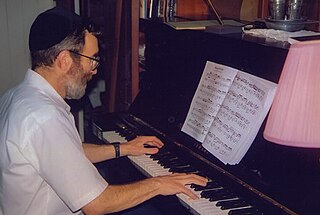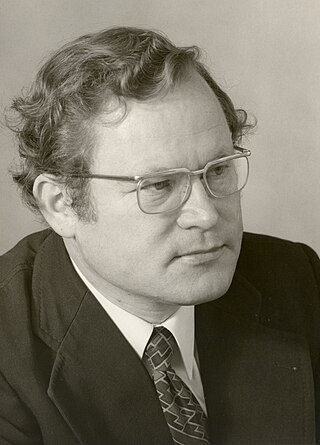Related Research Articles
Daniel Dorff is an American classical musician and classical composer.
Arnold Atkinson Cooke was a British composer, a pupil of Paul Hindemith. He wrote a considerable amount of chamber music, including five string quartets and many instrumental sonatas, much of which is only now becoming accessible through modern recordings. Cooke also composed two operas, six symphonies and several concertos.

Paul Schoenfield, also spelt Paul Schoenfeld or Pinchas Schoenfeld, was a classical composer and pianist known for combining popular, folk, and classical music forms. He was born in Detroit, Michigan and died in Jerusalem, Israel.
Easley Rutland Blackwood Jr. was an American professor of music, concert pianist, composer, and the author of books on music theory, including his research into the properties of microtonal tunings and traditional harmony.

Hans Gál OBE was an Austrian composer, pedagogue, musicologist, and author, who emigrated to the United Kingdom in 1938.
Martin Boykan was an American composer known for his chamber music as well as music for larger ensembles.
Zdeněk Lukáš was a Czech composer. He authored over 330 works.
Ernst Levy was a Swiss musicologist, composer, pianist and conductor.
Miguel del Águila is a prolific Uruguay-born American composer of contemporary classical music. He has been nominated three times for Grammys and has received numerous other awards.
String Quartet No. 2 by Walter Piston is a chamber-music work composed in 1935.

Herbert Blendinger was an Austrian composer and viola player of German origin.
Eda Rothstein Rapoport was a Jewish-American composer and pianist born in the Russian Empire.
Carl Frederick Dolmetsch (1911–1997) CBE was a French instrumentalist who specialised in the recorder.
References
- ↑ Pollack 1982, p. 80.
- ↑ Pollack 1982, p. 82.
- ↑ Yardley 1990.
- ↑ Pollack 1982, pp. 80–82.
Cited sources
- Pollack, Howard. 1982. Walter Piston. Studies in Musicology. Ann Arbor: UMI Research Press. ISBN 0-8357-1280-X.
- Yardley, Adrian. 1990. Liner notes, Darius Milhaud: Sonatina for Violin and Harpsichord, op. 257; Walter Piston: Sonatina for Violin and Harpsichord; Samuel Adler: Sonata No. 2 for Violin and Harpsichord; Bohuslav Martinů: Promenades for Violin, Flute, and Harpsichord; Edmund Rubbra: Fantasy on a Theme of Machaut, for Flute, Harpsichord, and String Quartet, op. 86; Cantata Pastorale, for Tenor Solo, Flute, Cello, and Harpsichord, op. 62; Antonín Dvořák: Bagatelles, for String Trio and Harmonium, op. 47. Tony Bouté, tenor; Bonita Boyd, flute; Charles Castleman and Julie Gigante, violins; Virginia Lenz, viola; Pamela Frame, cello; Barbara Harbach, harpsichord. Albany CD TROY041. Albany, NY and Carnforth, Lancashire: Albany Records.